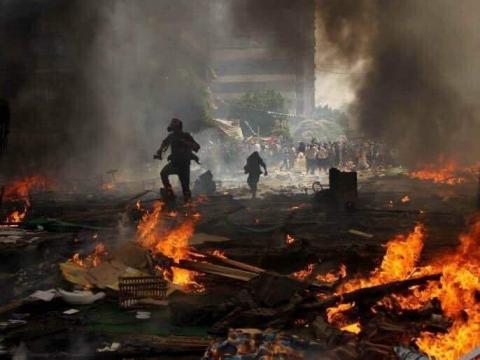
Alkarama regrets the lack of justice for the victims of the Rabaa massacre in Egypt, despite the decade since.
On August 14, 2013, police forces and members of the Egyptian army stormed Rabaa and Al-Nahda squares and opened fire on peaceful protesters, killing and injuring thousands of people and burning the bodies of the dead, in a horrific crime that caused a deep wound in the conscience of humanity.
Until now, the perpetrators of the Rabaa sit-in dispersal massacre in Egypt are still unaccounted for, justice remain absent, and the repressions continues to claim more victims at the hands of the military regime led by General Abdel Fattah al-Sisi.
Alkarama’s action
From the very first moment, Alkarama worked on the ground to document the events of Rabaa by monitoring and documenting the victims, who reached nearly a thousand dead and wounded within a few hours, in addition to thousands of detainees in the following days.
Alkarama also submitted the list of victims to the UN special rapporteur on extrajudicial killings and urged the UN High Commissioner to request the Security Council to refer these mass crimes to the International Criminal Court, in accordance with the provisions of the 2001 Rome Statute.
Back then, Alkarama’s director, lawyer Rachid Mesli expressed: "The excessive and bloody intervention of the army and security forces that was planned and carried out against peaceful demonstrators has all the legal elements that allow it to be considered a crime against humanity according to international law."
Despite repeated calls by various UN bodies and human rights NGOs, no serious investigation has been conducted to date. The families and relatives of the victims have even lost any hope of action by the authorities, given their direct involvement in the massacre.
Even calls by former UN Secretary-General Ban Ki Moon for full investigations into the Rabaa events fell on deaf ears by international actors and Western governments, and therefore went unheeded.
European Commission
Back then, due to its field work during the Rabaa events, Alkarama received a call from the Office of the High Representative of the European Union for Security and Foreign Policy at the time, Catherine Ashton, requesting to provide her with the list of victims. Alkarama took the initiative to respond to the request with the hope that serious positions would be taken regarding the massacre.
However, only a short time after, Mrs. Catherine Ashton celebrated New Year's Day in Luxor, an event hosted by the coup regime implicated in the horrific Rabaa massacre, which raises the question of whether that visit was a green light for the regime to continue its repression, arrests, and death sentences.
Double standards
It has become clear that there is a kind of duplicity and discrimination on the part of Western governments in dealing with the victims of Rabaa Square. In this regard, Rashid Mesli, director of Alkarama, says, "Despite the gravity of what happened, the double standards of the West were the master of the situation, and as soon as time elapsed, General Sisi was received in European capitals as if nothing had happened."
"The silence of international bodies on the massacres of the military in Egypt has encouraged further violations and repression to this moment."
Crime against humanity
Despite this, the families of the victims have not lost their hope in the possibility of holding the perpetrators accountable, and they are still adhering to their right to justice, says adviser to former President Mohamed Morsi, Mr. Ahmed Abdulaziz, who lost his daughter "Habiba" in the events of Rabaa: "The martyrs of Rabaa were in the thousands, not a few hundred, as the coup authority tried to convince the world! The number of martyrs (in my estimation) ranges between five thousand and six thousand martyrs, the bodies of the largest number of whom were bulldozed, and no place is known to them until today."
He adds: "There is no recognition of the power of the coup, no dialogue with the killers, and no amnesty for those criminals who committed this heinous crime, deliberately and determinedly, with the aim of shocking and intimidating to show their (total) control over the reins of affairs in the country. Their place is in the courts, not the tables of dialogue."
As for the Egyptian human rights activist Hussein Ammar, one of the eyewitnesses to the Rabaa massacre and one of its survivors, he does not see the need to review the history so that he knows that August 14, 2023 marks the tenth anniversary of that horrific massacre.
"The memories bring me back to the day of the massacre as if it had just happened and we are still locked up on that dark day in the history of Egypt. The smell of blood is everywhere, the pain remains and the scenes will remain present with all those who lived through these events until death ensued,"he adds, hoping that justice will be done, no matter how long it takes.
Lawyer Ashraf Tawfiq, director of Najda for Human Rights, said: "The Rabaa massacre, which killed 2,600 people in a few hours, constitutes a full-fledged crime against humanity under international law and will not be subject to statute of limitations."
Lawyer Ashraf Tawfiq adds: "The massacre was not only in Rabaa Square, but extended geographically to include 14 governorates with their centers and villages, and extended temporally until now. The butcher is still holding killing machines, to shed blood, sometimes by extrajudicial killing, sometimes by deliberate medical negligence inside prisons, sometimes by torture and sometimes by politicized death sentences. The international community must stop its support for the regime and remove the killing machines from its hands to stop the massacre."
